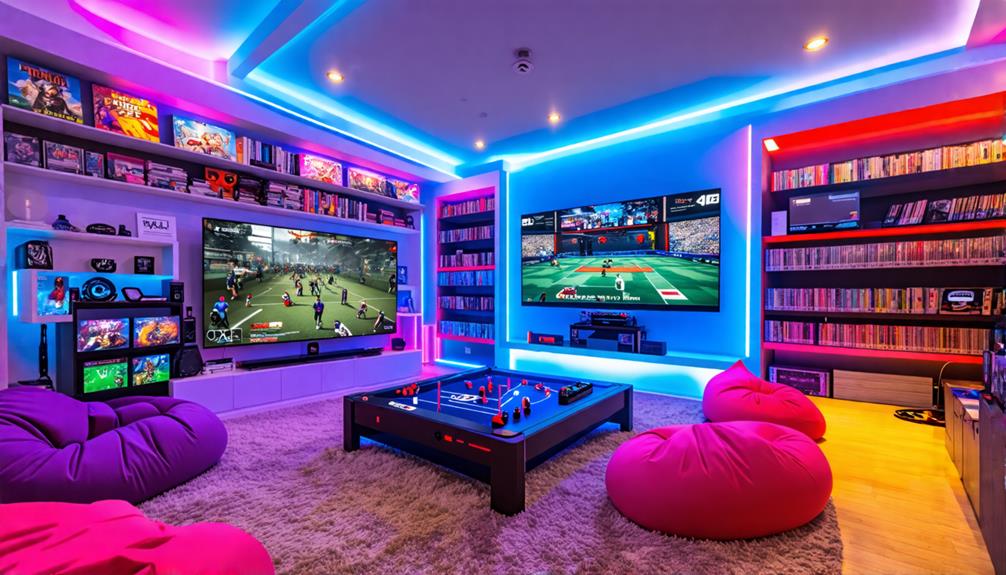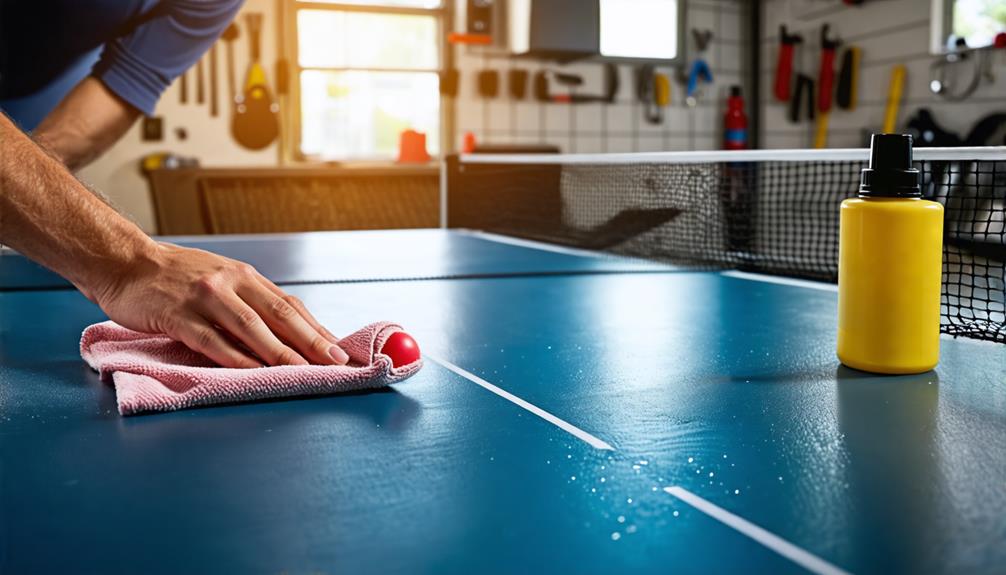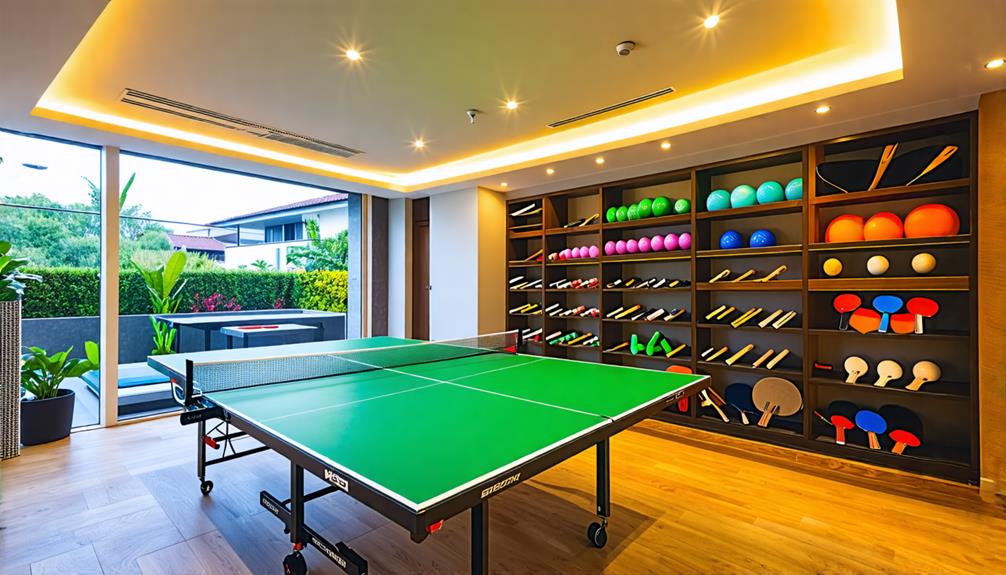Table Tennis vs. Pool: Which Game Is Best for Your Home Game Room?
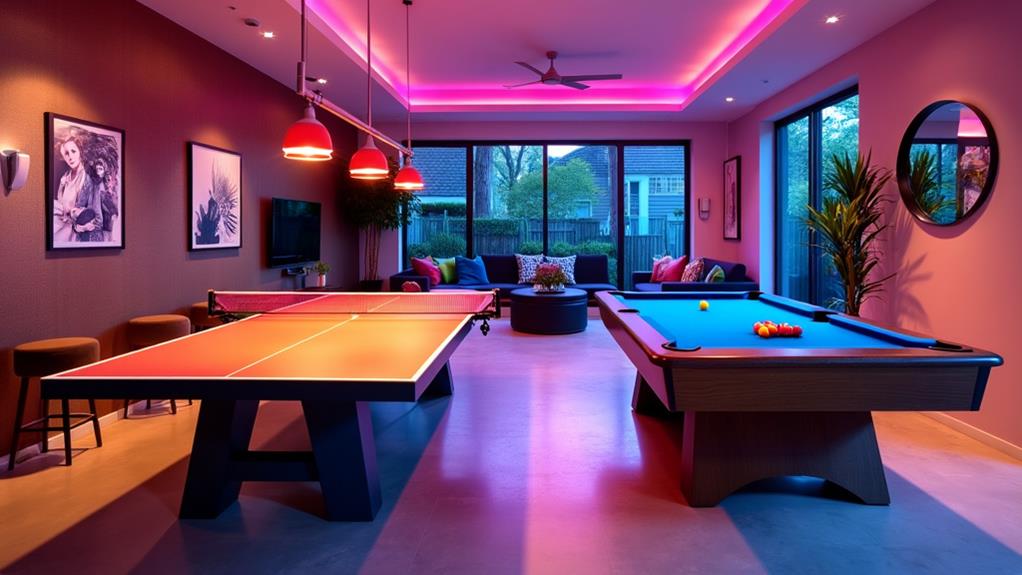
Choosing between table tennis and pool for your home game room hinges on your preferences for gameplay and environment. If you love fast-paced action and inclusive play, go for table tennis. It's more beginner-friendly and demands space for movement, but fits budget constraints well. Pool offers a relaxed, strategic experience with a sophisticated aesthetic, though it requires more skill, space, and has higher costs. Both boost social engagement, but table tennis offers quick matches while pool fosters deeper conversations. Consider your space, budget, and the type of social dynamics you prefer for a game room that suits your lifestyle best.
Game Characteristics
When comparing the game characteristics of table tennis and pool, you'll find distinct differences in their pace and style. Pool features slow-paced, strategic gameplay that emphasizes geometry and skill, making it ideal for longer, more contemplative sessions. You'll need to think several moves ahead, using careful shot-making to outmaneuver your opponent. This slower pace allows for longer game durations, fostering a relaxed and thoughtful atmosphere.
In contrast, ping pong offers fast-paced action that requires quick decision-making. The rapid exchanges and shorter game durations make it engaging for players of all stages and skill levels. Regardless of whether you're a beginner or an experienced player, the dynamic nature of ping pong keeps everyone on their toes and encourages lively social interactions.
Accessibility is another key advantage of ping pong. It's generally more beginner-friendly, making it easy for both children and adults to pick up and enjoy. While both games offer single-player options for skill improvement, pool allows for solo practice through strategic shot-making. Ping pong, however, often requires a partner for effective play, ensuring that you're always engaged in active competition.
Space Requirements
Evaluating the space requirements for table tennis and pool is vital for determining which game fits better in your available area. When contemplating ping pong tables, a standard one measures 9x5 feet. However, you'll need at least 11x19 feet to include room for player movement. This maneuvering space is significant due to the fast-paced nature of table tennis, which demands quick, wide-ranging movements around the table.
On the other hand, pool tables come in sizes ranging from 7 to 9 feet, with a 14x17 feet room size being ideal for accommodating proper gameplay. Unlike ping pong tables, pool tables require less movement space since the game is slower-paced and more about precision than agility.
Another point to reflect on is the storage aspect. Ping pong tables can be folded and stored away, freeing up room when not in use. Pool tables, however, are typically permanent fixtures, meaning they demand a dedicated space in your home game room.
Ultimately, the choice between a ping pong table and a pool table should take into account not just the dimensions of the table itself but also the necessary clearance around it to guarantee comfortable and enjoyable gameplay.
Aesthetic Appeal
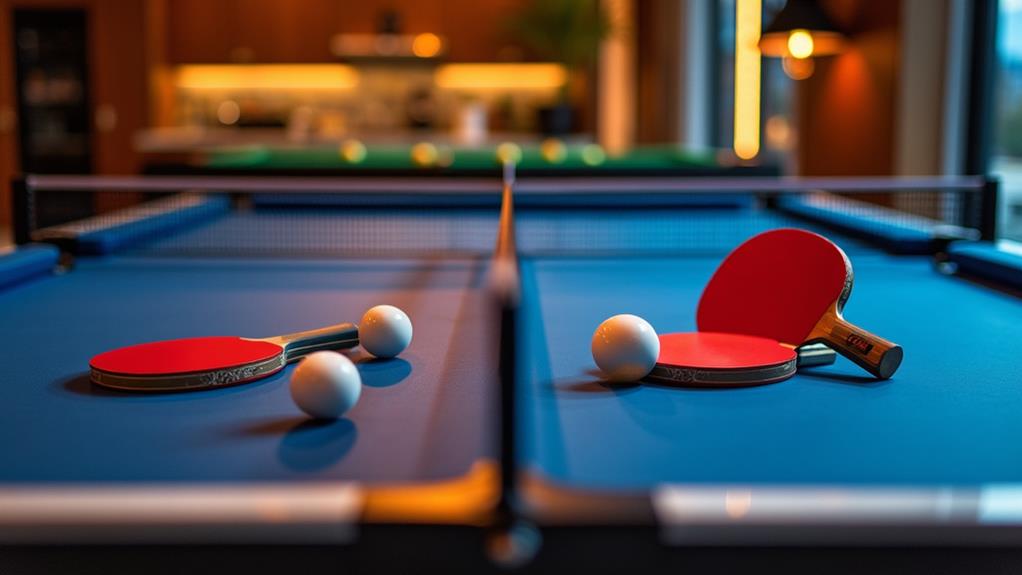
Beyond just fitting into your available space, the aesthetic appeal of your game room is another notable aspect to contemplate when choosing between table tennis and pool. Pool tables come in diverse designs and styles, from modern to ornate, making them stunning focal points in your game room's decor. High-quality pool tables often double as art pieces, enhancing the general aesthetics of your space with their grand and sophisticated appearance.
In contrast, ping pong tables offer a sporty and streamlined look, which easily integrates into existing room designs without overwhelming the space. Many ping pong tables are designed to fold and include wheels, providing versatility in storage and reducing clutter when not in use. This feature can greatly improve the aesthetic appeal of your game room by maintaining a clean, open environment.
Ultimately, the choice between a pool table and a ping pong table can profoundly influence your game room's aesthetic appeal. While pool tables generally offer a more grand and sophisticated style, ping pong tables bring a casual, functional elegance. Your choice depends on if you prefer a striking centerpiece or a versatile, sporty enhancement to your game room.
Financial Considerations
Choosing between a pool table and a ping pong table involves weighing the financial considerations. Pool tables generally come with a higher upfront cost, often exceeding $1,000 for a quality model. In contrast, you can find a decent ping pong table starting at around $200. This makes a ping pong table a more budget-friendly option right from the start.
When it comes to ongoing expenses, pool tables require more maintenance. You'll need to replace the felt occasionally, and any significant repairs usually necessitate professional help, contributing to the total cost. On the other hand, ping pong tables need minimal upkeep, making them easier on your wallet in the long run.
Accessories also factor into your financial considerations. Pool cues, balls, and other billiards gear tend to be pricier compared to the relatively affordable paddles and balls used for ping pong. If you're considering a conversion top to turn your pool table into a ping pong table, be prepared to shell out an extra $300 to $600, which could negate some cost advantages.
Ultimately, while both games offer long-term value, a ping pong table stands out as the more economical choice for your home game room.
Maintenance and Storage
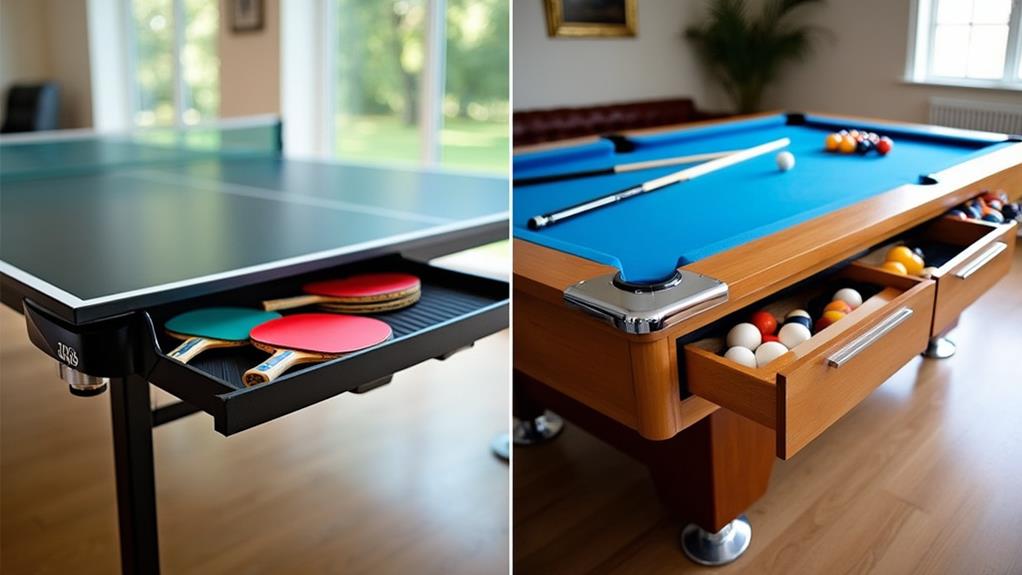
Maintaining and storing your game tables can greatly impact their longevity and functionality. Pool tables generally require less frequent maintenance compared to ping pong tables. However, you'll still need to cover pool tables to protect them from dust and scratches. Using rubber pads underneath can also prevent any unwanted marks. On the other hand, ping pong tables often need regular adjustments, especially to the net and the surface, which can wear out faster.
When it comes to storage, ping pong tables offer a significant advantage. Their foldable designs allow for compact storage, making them ideal for smaller spaces. You can easily tuck them away when they're not in use. In contrast, pool tables are bulkier and more challenging to move, demanding a dedicated space in your home.
Proper storage is vital to prevent damage. Ping pong tables should be kept in dry areas to avoid moisture damage, while pool tables benefit from being covered when not in use. Organizing and storing accessories for both games can be challenging, so plan your space carefully. Having designated storage solutions for cues, balls, paddles, and nets can help keep everything in order.
Social Engagement
Social engagement is a key aspect of both table tennis and pool, making them popular choices for gatherings and events. When you think about social gatherings, a game table can really set the tone. Table tennis promotes quick player turnover and energetic gameplay, which is perfect for keeping everyone involved and entertained. This rapid pace makes it easy to engage multiple players in a short amount of time, ensuring nobody feels left out.
On the other hand, pool games often encourage longer play sessions, allowing for deeper social interactions. You'll find that friends and family can engage in meaningful conversations and share skills while waiting for their turn. Pool tables also tend to be the focal point of a game room, enhancing its aesthetic appeal and providing a sophisticated atmosphere for your social events.
Picture this:
- Quick and energetic table tennis matches.
- Longer, engaging pool sessions with plenty of time for conversation.
- A pool table that doubles as a ping pong table for versatile play.
- A game table that serves as the centerpiece of your game room.
These features make both games excellent choices for fostering social engagement in your home game room.
Player Skill Levels

Understanding player skill levels is crucial when comparing table tennis and pool. If you're setting up a home game room, consider that Ping Pong is often more beginner-friendly. Players can quickly grasp the basics, making it easy for everyone to start enjoying the game right away. The quick rallies and fast-paced action keep everyone engaged, allowing players of varying skill levels to have fun without much downtime.
On the other hand, pool tables require a deeper understanding of angles and strategy. It takes longer to develop proficiency in pool, as the techniques and shot precision needed are more complex. This might create a divide between novice and experienced players, potentially making the game less inclusive for casual play among friends and family.
Both games offer opportunities for skill progression, but Ping Pong tends to be more accommodating for social play. It's easier for everyone to join in, regardless of their skill level. In competitive settings, table tennis's shorter matches and quick turnover allow players of similar skill levels to compete more frequently. Pool, however, involves longer matches and more strategic play, which can be less inclusive for beginners.
Decision Factors
When deciding between table tennis and pool for your game room, several factors come into play. You'll need to weigh each aspect to see which game fits your lifestyle and space best.
First, consider the gameplay experience. If you enjoy strategic, slower-paced games that allow for longer play sessions and social engagement, a pool table might be the ideal choice. On the other hand, if you prefer fast-paced, energetic games that cater to quick player turnover and are more accessible for beginners and families, a ping pong table could be more your speed.
Next, think about the aesthetic appeal. A pool table can serve as a grand centerpiece in your game room, adding a touch of elegance. A ping pong table, however, offers a sporty, streamlined look that can easily integrate with existing decor.
Then, there's the matter of space requirements. A pool table typically needs a larger room (14x17 feet on average), while a ping pong table requires around 11x19 feet including maneuvering space.
Finally, evaluate your budget. Pool tables generally have a higher initial cost and more expensive accessories compared to ping pong tables, which can be found in more budget-friendly options.
- Strategic, slower-paced gameplay
- Aesthetic appeal as a centerpiece
- Space requirements
- Budget differences

